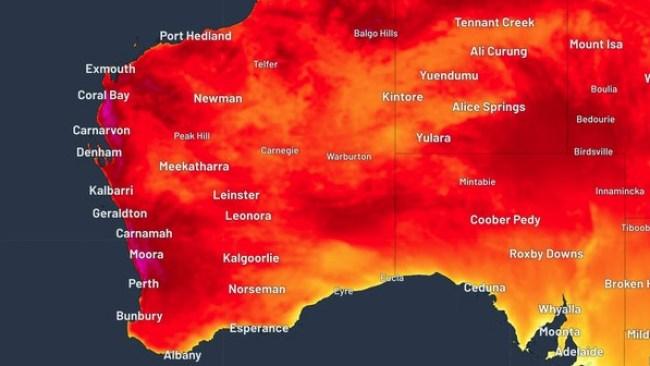The Heat is On in Western Australia
Western Australia is in the grip of a severe heatwave, with temperatures soaring to record-breaking heights. Perth and surrounding areas are expected to bear the brunt of the heat, with the mercury set to climb a scorching 11C above average on Wednesday.
Geraldton Sizzles Before Sunrise
Residents in Geraldton woke up to a sweltering 32.1C temperature before sunrise, with other areas in the mid-west region also experiencing extreme heat. The coastal city of Mandurah wasn’t far behind, with temperatures already reaching 21.9C by 4am.
Heatwave Warning Issued for Multiple Regions
The Bureau of Meteorology has issued a severe heatwave alert for several regions, including Gascoyne, Goldfields, South Interior, Central West, Lower West, Central Wheatbelt, and South East Coastal and South West. Areas likely to be most impacted by the heat include Perth, Gingin, Hyden, Lake Grace, Mount Magnet, Merredin, Morawa, Narrogin, Northam, and Yanchep.
Hot and unsettled conditions are building over much of #WesternAustralia, including #Perth. Low to severe intensity #heatwave conditions will impact much of the south and south-west of the state. #HighFireDangers are also forecast.
Latest: https://t.co/4W35o8i7wJ pic.twitter.com/bQVXeUSe5K
— Bureau of Meteorology, Australia (@BOM_au) December 10, 2024
Peak Heatwave Conditions Expected on Wednesday and Thursday
The heatwave is expected to peak on Wednesday and Thursday, with maximum temperatures forecast to reach the mid-30s to low 40s. Overnight relief will be minimal, with temperatures expected to settle in the low to high 20s.
Severe Thunderstorms Possible in the Afternoon
There is a slight chance of a shower or severe thunderstorm in the Perth Hills region in the afternoon and early evening, but the rest of the city is expected to remain sunny.
Perth Set to Smash Average Day-Time Temperature Record
Sky News Weather presenter Julia Seymour said Perth is set to surpass its average day-time temperature for December on Wednesday. “A heatwave warning is active for much of the south-west today, including the Perth metro areas,” Seymour said. “It is going to be absolutely sizzling, getting to a top of 39C today – that’s 11C above monthly average.”
Warmest String of December Nights in 59 Years
Perth has already smashed its average minimum temperature for December, with the capital recording 23.8C by 6:30am local time. The city could also see its warmest string of December nights in 59 years, with temperatures forecast to remain above 24C for the next three nights.
Queensland Continues to Sizzle
Meanwhile, hot and stormy conditions are ongoing in parts of Queensland, particularly in the tropics and northern regions of the state. The Peninsula, Northern Goldfields and Upper Flinders, North Tropical Coast and Tablelands, and Capricornia and Central West districts have been warned of severe heatwave conditions.
Cairns and Weipa to Reach 34C and 36C Respectively
Cairns is bracing for 34C on Wednesday, while Weipa on the Cape York Peninsula is expected to reach 36C. The North Tropical Coast and Tablelands areas, including Port Douglas, are also forecast to reach 36C.
Peak Temperatures in the Mid-40s and Overnight Temperatures in the Mid-20s
Seymour warned that temperatures will continue to rise throughout the day, with peak temperatures expected to reach the mid-40s and overnight temperatures in the mid-20s. “It is going to be very warm indeed,” she said.
Safety Precautions Issued
The Bureau of Meteorology has warned that severe heatwaves can be dangerous, particularly for people with medical conditions, the elderly, babies and children, and pregnant and breastfeeding women. Locals in heat-impacted areas have been urged to keep cool at home, or in air-conditioned spaces like libraries, community centres, or shopping complexes.
Stay Safe and Stay Informed
As the heatwave continues to grip Western Australia and Queensland, stay informed with the latest weather updates and forecasts. Remember to take necessary safety precautions to stay cool and safe during this extreme heat event.

